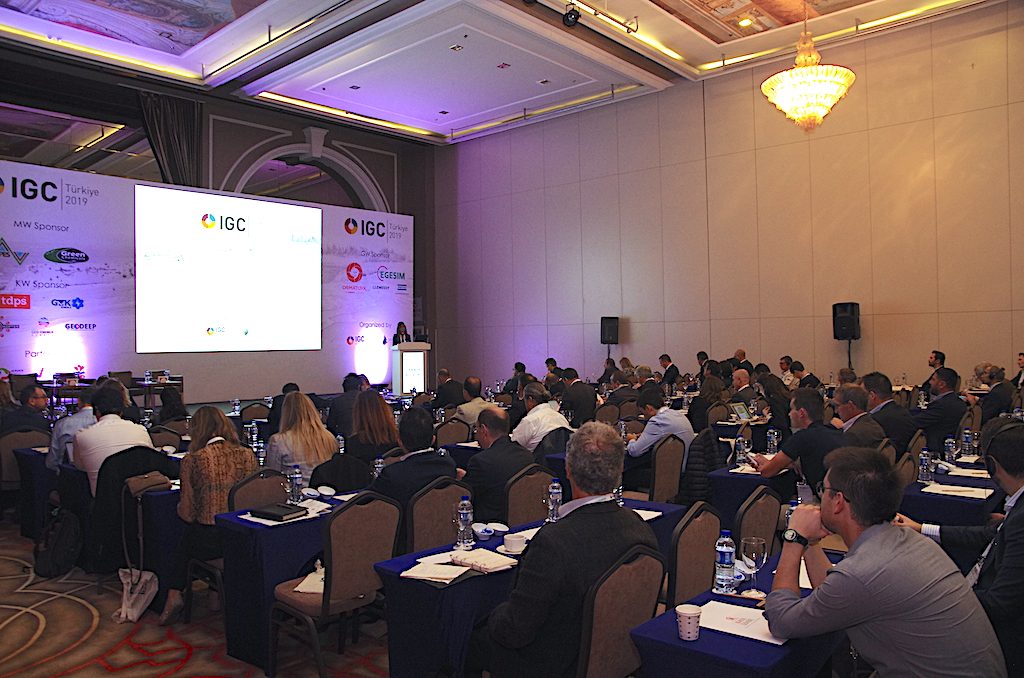
Following the incredibly paced growth of Turkey’s geothermal sector, the immediate future is less clear. Anxiously waiting for the announcement of the continuation and value of the feed-in-tariff, the sector though remains optimistic to continue its growth.
The 4th IGC Turkey Geothermal Congress & Exhibition took place in Izmir, Turkey concluding with a field trip to the Özmen 3 geothermal power plant by Özmen Holding/ Sis Enerji Üretim A.?. in Alasehir, Manisa.
The event brought together around 250 participants from Turkey, but also from abroad. Again representing a wide range of representative from all major developers and suppliers, presentations and discussions of the congress covered key topics in geothermal development and utilisation in Turkey today. The event would not have been possible by the great support by the partners to the event and the key sponsors of the event, OrmaTurk, EGESIM, Atlas Copco and Clemessy, but also CAPES and Green Chemicals.
The GEORISK workshop, organised by the European Geothermal Energy Council (EGEC) opened the events of the congress last week. The event discussed options for de-risking geothermal development and the available schemes for risk mitigation in Turkey, featuring speakers from TKB, and TSKB, as well as an overview on the establishment of geothermal risk mitigation schemes in other countries.
The Congress Day, again showed the importance of the feed-in-tariffs on the fast geothermal development in Turkey and the challenges faced by the industry with the current uncertainties regarding the tariffs. While the sector remains carefully optimistic due to the indicated continuation of the tariffs, speakers indicated a more careful approach to planning further development.
Availability of financing for the sector is currently scarce, simply due to the lack of confirmed FIT going forward, and this holds back investments into development. So currently only projects that fall under the previous FIT-scheme and pricing are finishing construction.
The sector is also addressing environmental impact issues and CO2 emissions by plants in Turkey. This naturally goes hand in hand with an approach to stakeholder and community engagement. The congress actually invited a local student from an area that has seen a particularly negative view on geothermal development in their community. It showed that there is still a lot to do to address concerns of local population, but also better promote what geothermal energy has to offer.
In the session on electricity generation, plant suppliers highlighted their way of addressing the risks of geothermal operation, both in terms of the technology solution on size and operation. It further discussed how non-condensable gases can be treated in plants, strategies to reduce CO2 emissions, how to responsibly manage the resource for best and sustainable generation of electricity, but also the impact of regulation, financing, incentive schemes etc have on the overall development of the sector.
With the great opportunities provided by geothermal energy for heating, the forum on heat utilization received great interest. Utilising geothermal energy beyond power generation is still remarkably under represented today. But the opportunities for the health/ tourism sector, as well as for greenhouse horticulture and hybrid solutions using solar and geothermal were highlighted.
The forum on future perspective addressed opportunities beyond the current approach to geothermal development, including better efficiencies for plants, the utilisation of EGS – engineered geothermal systems – for further development, and the opportunities provided by extracting lithium were discussed.
Likely the always most interesting forum was again this year’s session on Reservoir Management. With the current state of development, operators are increasingly looking at efficiency of resource utilisation and the plants. So presentations on reservoir monitoring and well tests, reinfection rehabilitation, flow test methods and management and maintenance of resources and plants provided a great insight for participants.
After the congress day, participants of the congress joined the IGC lounge providing a great opportunity to mingle, get to know each other and discuss the presentations of the day. The ambient atmosphere with finger food and drinks facilitated again informal discussions and networking.
Following the congress, the GeoTHOUR field trip brought participants to the 22.3 MW Özmen 3 geothermal power plant by SIS Enerji. The field trip was sponsored by EGESIM and its partners.
The organisers would like to thank GMK Enerji, French geothermal cluster GEODEEP, TD Power Systems, Fotokopter and Geo-Energy Europe, as well as our partners, JESDER. EGEC, Turkish Chamber of Petroleum Engineers, Chamber of Geology Engineers – Izmir, and the Geothermal Association of Turkey.